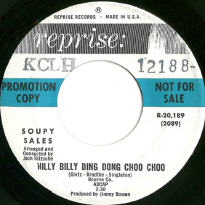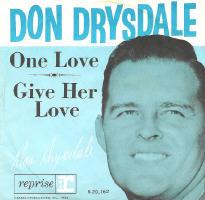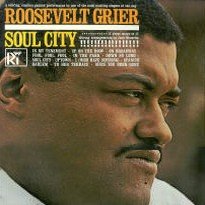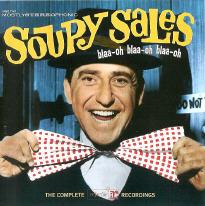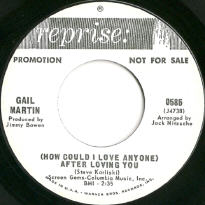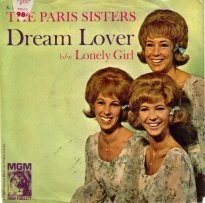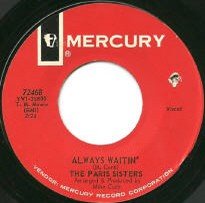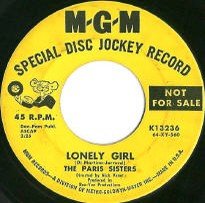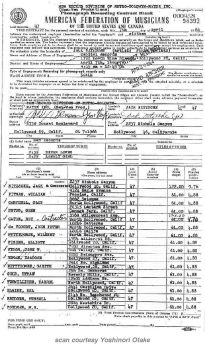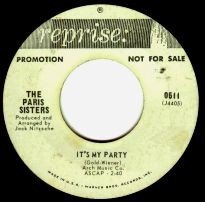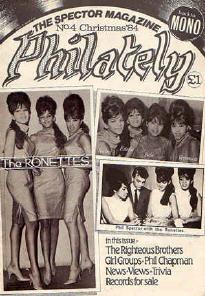| Celebrities | St. Giles | Crazy Horse | Three Piece | Lonely Surfer | Paris Sisters | Celia Marie | Mike Clifford |
At times it seems that all sportsmen, comedians, actors and models.... in fact anyone in the public eye, regardless of whether or not they posess a singing voice, wants to have a crack at the charts. Jack worked with his share of celeb's. Singing was a natural part of the show-biz career of Doris Day, Eddie Hodges, Dino, Desi & Billy and even Dora Hall. The top-40 chart aspirations of comedian Soupy Sales, entertainer Gail Martin and sportsmen, Don Drysdale and Roosevelt Grier however, were more tenuous. Denny Bruce has a good story to tell...
Jack Nitzsche - Arranging With Stars In His EyesDon Drysdale, along with Sandy Koufax, were the best pitchers in the major leagues in the 60s, and both played for the LA Dodgers, who were still a new team to LA, after being the Brooklyn Dodgers for a long time.
Roosevelt "Rosey" Grier was a giant of a man, big, heavy, and fast who played defense and was feared for his power. Jack said he had the worst sense of timing for a singer he had ever worked with. They were doing, "I Who Nothing" which of course was a hit for Ben E King. Everyone knew the song. Maybe in the showers after a game he would sing and his teammates would say "hey man, you're a hell of a singer." Jack did the track, and Rosey shows up with 4 of his teammates, who all wanted a show-biz career, whatever would be would be. Standing in the studio wearing headphones (probably for the first time in his life) the track would play and Rosey was maybe hypnotized by hearing the music but didn't sing.
Jack said "Rosey, you know when to come in, don't you?
" In listening
to the Ben E King song, the arrangement is not just a standard arrangement,
and the first word "I" followed by "who have nothing" sold the song. Well,
they tried to just record "I" and once they got that Jack thought the battle
was over. Wrong!! He then brought Rosey into the control room, and let him
listen to the playback over the studio speakers. Jack said, "Once you
hear the intro if you count to yourself,
(I forget the number) 1,2,3,4,5
it's time to sing "I"
". Well, that did not work. So Jack stood up, and
would lift his fingers: 1,2,3,4,5 and 'cue' Rosey. This only rattled him
more. Jack would try and capture the rhythm of the track, with body language,
and try his damnest to make him feel where "I" came in. The guy had no sense
of rhythm, and one and a two and now I point and you sing "I" backfired.
Rosey's eyes were like a deer trapped in the headlights - he focused on
Jack, but when he brought down his arm to point at Rosey, he would just
blurt out "I."
This is the bullshit not a lot of people know about how tough it is to make records with celebs. Soupy Sales was equally bad, but hilarious to work with, because he's a comedian.
Rosey went on to national fame, as he was with Bobby Kennedy the night Sirhan Sirhan shot him at the Ambassador Hotel, LA in 1968. Rosey actually grabbed him, and threw him to the ground. Jack and I were roommates at the time, and saw it live on TV.
Denny Bruce.
Don Drysdale
"One Love" was recently played as the ROTW, read the review. Nice picture sleeve but as a singer Don was a safer bet staying as a pitcher!
Roosevelt Grier
By the time the two sessions had finished no evidence was left of the recording difficulties. The tracks are all collated on Rosey's, "Soul City" LP. "I (Who Have Nothing)" and "To Her Terrace" are reviewed on the Previous ROTW page. If you like these you're bound to enjoy the LP.
Soupy Sales
Funnily enough the two Reprise 45s by Soupy Sales are the most enjoyable of the 'Celebrities On Record'. Jack recounts in his BOMP! interview how he liked recording these because of having his son in the studio with him. Maybe so but the three vocals, ("Santa Claus Is Comin' To Town", being the instrumental flip to "...Surfin' To Town") are, even without knowing of Soupy Sales, great novelty Rock and Roll. And they are available on a Rhino HandMade CD. Click the cover scan for track and buying information.
Gail Martin
Dean Martin's children were born into the gloss and glitz of 'show-biz', some embraced it; Dino, Gail and Deena recorded for Reprise Records; Claudia appeared as a guest on TV shows and movies; Rikki is currently appearing in a stage tribute to his father, but all remained natural and unaffected. Despite Gail's sweet voice and four 45s she did not achieve the chart or critical success of her brother's group, Dino, Desi & Billy. Gail's celebrity status was born to her and she wore it well. Gail Martin's recording, "Theme From "The Sand Pebbles" (And We Were Lovers)", has featured as a ROTW.
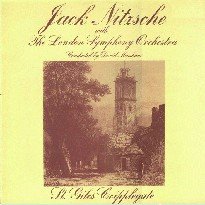
1981 UK LP cover
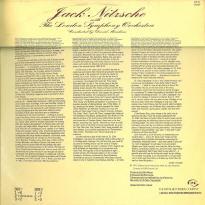
Possibly the best review of Jack's work, written by Andy Childs.

Still promoting good music, check out Karel's "Laughing & Music Matters in Paris" site.
In 1980 I was associated with the very independent classical record label Nimbus, I had my own record label Initial Recording Co and the state of the art Nimbus plant pressed the albums we released. The owners of Nimbus introduced me to some great classical musicians through the recordings that they had made and I in turn decided to turn them on to someone I considered to be be America's most under-rated-exposed-recorded contemporary classical composer, Jack Nitzsche. I played them St Giles Cripplegate without explaining Jack's background... this rarely heard gem was, I told them, almost certainly available for re-release and to put Jack on a bona-fide classical label struck me as being a very sensible move. Nimbus impressed by the work gave me carte blanche to negotiate obtaining the rights to re-release one of the most unusual records to ever be released by Warner Brothers.
When I tracked Jack down he was flattered and enthusiastic about seeing his masterpiece released by a critically acclaimed classical label.
I first met up with Jack when he and his manager were passing through London on the way back from Sweden where they had been recording the soundtrack to "Cruising" (I think). This was in 1980, tricky times for Jack who spent most of his time locked away in his hotel room. I negotiated with Kip Krones his manager at the time... though everyone was keen on having Nimbus put St Giles out there was a problem, Andy Childs at EMI had just bought the tapes for a UK release. It was suggested I contact Andy and see whether EMI might sit this one out. As it happened despite Andy's fan-based enthusiasm and highly informative sleeve notes, the top-brass at EMI could see no future no the project and had been holding up the release for months. Andy just wanted to see the record back in the stores and could see no reason why we couldn't buy the masters at cost off EMI. Now whether dealing with an independent such as Nimbus or a major like EMI, it's still the record business and things never quite work out according to plan. Nimbus had a change of head and heart so I decided to release the album on my own Initial label. I went out to LA to meet Jack and try to interest the various local correspondents of the UK music press in doing features on one of the most intriguing figures in American contemporary music. Only Sylvie Simmons took the bait and later interviewed Jack for an article that was published in Sounds. Jack it would appear was destined to stay in the backroom for the foreseeable future. Since to my knowledge no one wanted to write about Jack I took it upon myself to do a fairly in-depth interview with him at his home. Although a little ill at ease with having even the rim of the spotlight shining upon him he cooperated with some enthusiasm and was forthcoming with many anecdotes and insights into artists and the recording process. The interview, with selected tracks added, was later broadcast by BBC Radio Oxford.
The Initial re-release of St Giles was greeted with much the same indifference, as was the Warner Brothers version ten years earlier. When he died he was given a lengthy obituary by French journalist Philippe Garnier in Liberation, the same Philippe Garnier who I spent considerable time trying to persuade to do an interview and article over twenty years earlier. Seems you don't get those column inches during your lifetime.
When during a smokey evening in Lyon in 1972 an adventurous French music lover turned me on to St Giles Cripplegate and Kryszstof Penderecki in quick succession, I had the impression that I'd just heard a work by America's most promising late 20th century classical composer, that he should be the same person who had arranged River Deep Mountain High, Do I Love You, Hung On You etc. made perfect sense, for he was in a unique position to bring the entire spectrum of 20th century music together... I'd hoped that the re-release of St Giles might result in his being commissioned to write yet more serious works, it wasn't to be. We must make do with the one symphonic work, the various movie scores and maybe somewhere in a drawer in that backroom a few scribbled scores... waiting to be performed.
Karel Beer
I bought my copy of the UK released "St. Giles Cripplegate" only recently oddly enough on a visit to New York. Naturally I was aware of the release but it was only upon reading "Zig Zag" magazines founder Andy Childs excellent sleeve notes and pondering the absurdity of the re-issue that I decided to attempt and find out the 'why and how'.
I was very lucky. Not only did I make contact with the founder of the Initial Recording Co., Karel Beer but the story of its release was as interesting as I could hope. The rumour excists that the original US issue on Warner Brothers sold less than a thousnd copies: so what was the motivation for this release? As I'd summised and Karel's article amply displays a love of the music and a desire to share this with as many folk as possible. Fairly early in our exchange of correspondence Karel mentioned interviewing Jack Nitzsche and I am thrilled that he has agreed to the site featuring the interview in full on the Radio Page. If you missed the interview on its first play please keep your eyes and ears peeled because it will be repeated.
Karel's energies are now directed at promoting musicans and comedians through his "Laughing & Music Matters in Paris" promotion company. Check it out!

Chris P. James is a freelance writer and the editor of SHAKE! Magazine,
the only rock & roll magazine in Nashville. He can be reached at
Lostside@aol.com.
The Spring 2003 issue of SHAKE! featured an excellent interview and career
review of the band. Well worth checking out; contact Chris for information.
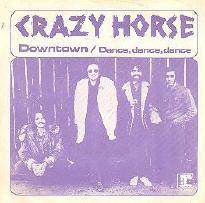
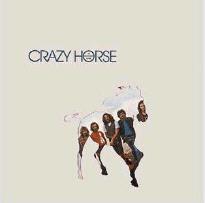
Jack Nitzsche made a name for himself as the guy who orchestrated many classic rock pieces. He was the man with the technical knowledge of musical notation for strings and horns that embellished the recordings of many people during the golden days of California rock. Much like George Martin did for the Beatles, Jack could bring sophistication to otherwise primitive artists. His work with Neil Young, most notably on "Broken Arrow", brought him into the Crazy Horse picture.
When Neil Young left Crazy Horse, they chose to branch out on their own album project. Jack wanted to be in the group. This band was centered on the singing and songwriting abilities of Danny Whitten. Nitzsche's interest in it was that the band offered him a chance to get off as a barrelhouse barroom piano player in a rock & roll band. Instead of all the complicated symphonic touches, Jack could ease back and hammer away at rock tunes. Long time Crazy Horse roadie, Willie "Baby John" Hinds says that quite simply "Crazy Horse in Jack's mind was an American Rolling Stones." Neil Young has also been known to cite the group as his Rolling Stones. And Jack had worked with The Stones. He saw first hand how much fun they were having. Nitzsche had begun writing some rock and roll tunes too. He needed a good outlet for them.
So that's it in a nutshell. After seeing so many of the rock stars having so much fun, Jack Nitzsche wanted to step out from behind the scenes and get a taste of the rock & roll vibe. You can hear it in his playing with the group. It's rather surprising, in fact, that a guy known for all that classically inclined stuff would get behind a piano and just bang away eighth notes like Jerry Lee Lewis. Good for him!
He did it just for fun. It ain't rocket science.
Chris P. James
Editor Shake! Nashville
Six of the Best - Jack Nitzsche and Crazy Horse:
Eddie Hodges - The Water Is Over My Head - Aurora 156 '65
Jack noted this recording as his first with the band later to be known as
Crazy Horse. And what an introduction! Jack arranged seven released tracks with Eddie
and all are first-rate but the best and the hardest edged is this version of Bob
Dylan's song.
Chris describes in 'Playing For Fun' how Crazy Horse brought the Rock'n'Roll
back into Jack's life and I'm sure that after being vocalists on this, Danny Whitten
and the rest of his 'Memories' must have hardened their resolve to change from a
vocal group into a rock group, first as The Rockets and then with a change of some
personnel into Crazy Horse.
Crazy Horse - Crazy Horse - Reprise LP 6438 '71
Gone Dead Train Lead track from their debut self-titled LP and the groove is set;
solid rock and blues with a little country added to make sure you're paying attention.
Written by Jack and Russ Titleman with a gritty lead vocal by Danny Whitten that surpasses
the earlier vocal by Randy Newman from "The Performance" soundtrack.
I Don't Want To Talk About It A bit of a tearjerker, you'd have to have a heart
made of lead not to be moved by the sadness in Danny's voice. Ry Cooder's slide guitar
floats in and out of this wonderfully sympathetic arrangement, the recording couldn't
be beaten: naturally Rod Stewart had the hit.
Crow Jane Lady Get the spliff going, close your eyes and just let this one roll
over you; a voice that inspired Tom Waits and bar-room piano from Jack, a loose but
rock-steady beat from Ralph, Billy and Danny that allows Ry to slide and Nils to pick.
Crazy Horse - At Crooked Lake - Epic 31710 '72
By the third LP only Ralph Molina and Billy Talbot were left from the "Crazy Horse" album and a cryptic credit, "Produced with help from the piano player at Greaser's Palace". More folk-rock than driving rock some of the songs are really quite beautiful;
Love Is Gone New boys, Rick and Mike Curtis penned this "better to have loved
and lost than to have never loved..." ode and the warmth emanating from the song with
its mandolin and steel guitar intro and gorgeous harmonies is enchanting.
Your Song There is plenty of 'rock' on the album, "Rock And Roll Band", "Lady Soul"
and "Don't Look Back" for instance, but the final track I've chosen is another song of
love. Written by the third addition to the group, Greg Leroy, who couples homespun wisdom
of the 'Don't burn your candle at both ends'-type with an honest musicianship and vocal
that just works beautifully.
Harry Flowers
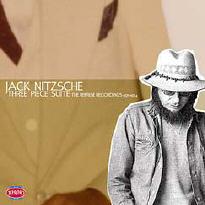

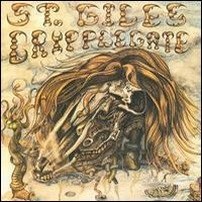
1972 US LP cover

1981 UK LP cover
 Possibly the best review of Jack's work, written by Andy Childs.
Possibly the best review of Jack's work, written by Andy Childs.
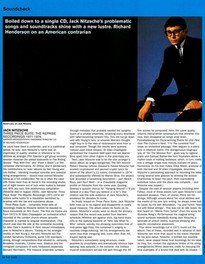 From the pages of UK monthly WIRE a perseptive review written by Richard Henderson.
From the pages of UK monthly WIRE a perseptive review written by Richard Henderson.

A good review
by Lindsay Planer.

Please read another good review by Andy Beta.
Previously only available from Rhino (and shipping to the USA only) the CD is now on general release. So now you have no excuse not to buy a copy!
(Rhino Handmade RHM2 7787 Released November 7th 2001)
As is well explained in the informative and fascinating CD booklet, this lovingly crafted project is three works from Jack Nitzsche on one disc.
The first part is the released but hard to find 1972 album, "St. Giles Cripplegate"; the second - and for me the most glorious and uplifting - is Jack's unreleased fifth album and finally we have four early 70s vocal demo tracks.
The recording of "St. Giles Cripplegate" is discussed in great detail; as to a lesser degree are the demos. Follow the link to the Crawdaddy interview from Nitzsche On The Rack for Mr. Nitzsche's account on how his proposed LP was heard. Although rather sad, it sheds light on how the album was received. Jack put on a brave face but really he must have felt devastated. Much of the album does not strike home immediately. But after a few plays and that's it! %$#@&() AMAZING! The quality and involvement wash over you when hearing this. Imagine the rejection Jack must have felt...
The Rhino Handmade CD is worth the price for this LP alone. The inclusion of the "St. Giles Cripplegate" LP, the demos AND the great sleeve notes make this an essential purchase.
LISTENER MAGAZINE CD REVIEW
Thanks to Denny Bruce who forwarded the following review of "Three Piece Suite", originally published in the Listener and written by Matthew Greenwald:
Jack Nitzsche: Three Piece Suite
Original recordings produced by Elliot Mazer, Jack Nitzsche
and Robert Downey
Compilation produced by Roland Worthington Hand
Rhino Handmade/Warner Archives RHM2 7787:
Jack Nitzsche is not exactly a household name. But his arranging and session work with Phil Spector (he wrote the charts for virtually all of Spector's classic early/mid-60s sides, from the buoyant "He's A Rebel" to the high-wire act of "River Deep - Mountain High"), Neil Young, The Rolling Stones, Crazy Horse and numerous others, is easily enough to make him one. On top of that, he was responsible for some of the most innovative and inventive soundtracks in modern history: The Exorcist, Performance and One Flew Over The Cookoo's Nest are just a few examples of this. Hell, even his work on the 1966 sub-B teen-exploitation flick, Village Of The Giants was groundbreaking. Oh, yeah, he was also nominated for a Grammy for co-writing "Up Where We Belong". But his recorded legacy as solo artist is not that well known (if not a complete mystery), even though his timeless early 60s track, "The Lonely Surfer" was Reprise Records' first pop hit.
Three Piece Suite successfully reconnoitres his truly remarkable talent and revolutionary vision. As the title implies, the disc is divided into three sections. The first part is the entire St. Giles Cripplegate album. Recorded with the 130-piece London Symphony Orchestra shortly after Nitzsche's work on Neil Young's Harvest, it is a sprawling piece of modern classical/avant-garde work that really defies genre classification. About half of the tracks rate up there with the likes of Vivaldi in terms of temperate, pastoral splendor. Yet other parts - such as the album's opener, "#6" - are as imaginative and downright scary as anything included in The Exorcist (the soundtrack or the actual film). There is a strong Bernard Hermann influence in several sections, particularly in the use of piercing cellos. It's a challenging but ultimately rewarding listen, and stretches the senses like no other modern classical music on the planet.
The second part of the record is the complete version of a mid-70s Nitzsche solo album (which he wrote with fellow renegade, Robert Downey Sr.). After all that Nitzsche has accomplished up to that point, it comes as a complete surprise that he made what is, for all intents and purposes, a singer/songwriter album. Fusing his and Downey's near film-noir vision of a Los Angeles on the verge of apocalypse, it is a truly exalted and engrossing piece of work. Easily on the level of some of the more renowned works by Van Dyke Parks and Randy Newman, this album (previously unreleased, but assembled and mastered) is dominated by a spiky vision and some pared-down (yet still innovative) arrangements. Nitzsche's vocals are as soulful and sincere as anything Parks or Newman had put down. On top of that, one song ("Lower California") may be one of the greatest Beach Boys records not recorded by the group. Why the record remained unreleased (until now) is still a mystery. It's a fucking shame that it takes artists' death to finally bring this stuff out.
A handful of demos closes out the set, and all are ravishing in their personality and construction. Of particular note is "Carly", which is about Carly Simon's famous early 70s debut at L.A.'s Troubadour. Nitzsche was no doubt smitten (hey, who can blame him), and it's a positively endearing statement. The package also contains two excellent and heartfelt recollections from Elliot Mazer and Denny Bruce, both of whom knew and worked with Nitzsche extensively.
Given Nitzsche's career and reputation, the irony of the fact that Three Piece Suite is only now available on this limited-edition collection is not lost on this writer. Unlike fellow musical revolutionary Van Dyke Parks, Jack Nitzsche didn't appear to be willing to play by (or even really learn) the nebulous 'rules of the game' that the Los Angeles music industry is apparently based on. But with this collection, you have a chance (if you act soon) to discover a good cross-section of Nitzsche's brilliance. He had that rare ability to capture lightning in a bottle. Constantly.
Matthew Greenwald
(January 2003)
When The Miracle Happened
I ordered Jack Nitzsche's "Three Piece Suite," and listened to it in segments, under the best circumstances possible. Part one, "St. Giles Cripplegate" remains as opaque as ever to me, sounding much like movie soundtrack music; it makes sense that he scored 40 of them. "For Mori" is, however, very beautiful. I think upon repeated listening the entire work is certainly the equal of much 20th century classical music. If released on a more classical-oriented label than Reprise, it might have received more - and more favorable - attention.
I wish I could write a glowing review of part two, the solo vocal album. While I hear the beautiful Van Dyke Parksian influences - not to mention some magnificent Spector-related production - I find most of the songs to be more like phrases or snippets that either never go anywhere or get stuck on the same thing for two long. There are great moments, of course - the lyric "Hey, Mo, where you goin' with that rock in your pocket?" equals my favorite Van Morrison lyric, "In the land of a thousand dances, I danced with you." Pure Dada brilliance. I really wanted to love this album, as much as I did the reviews on this site that attracted me to it, but I fear that the liner notes' frequent references to Nitzsche's heavy drinking can be heard in too much of what I've listened to so far. If I had been Mo Ostin, I'd probably have chosen not to release it either. Sad, because with all its flaws, I'm still a big fan. When Nitzsche was on, he was unparalleled.
I have some new-age friends who frequently say, "Don't give up before the miracle happens." Well, it happened on the third part of this CD. I haven't stopped playing the first two demos of the four that end the disc. "I'll Bet She Knew It" is totally haunting - vocal influences from Van Dyke Parks and Al Stewart, and a gorgeously Spectorian outline that hints at where this could have gone - but it's also already there on its own. "We Have to Stay" borrows a Righteous Brothers riff and uses it as a chord structure; Nitzsche's mournful, cracking and warbling vocal is a total heartbreaker - Van Dyke Parks on broken glass. These two tracks own me for the moment, and I can tell they will be ongoing favorites. They alone are worth the price of admission, at least for me. ("Carly" is pleasant, but "Reno" honestly didn't move me.) I suggest that some contemporary artist who respects Nitzsche, Spector and Brian Wilson rediscover these two beautiful songs and realize the potential of these demos. But even without reworking, these two tracks cry to be heard.
Country Paul Payton
(adapted from a review originally in the pages of Spectropop)
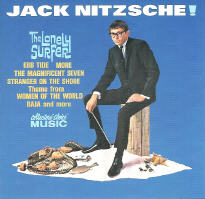

Many thanks to Alan Taylor for making this review available for the Site, Alan and Dave Burke are the editors of Pipeline The Rock Instrumental Magazine, the World's No.1 instrumental 'zine.

The Lonely Surfer / Puerto Vallarta / Stranger On The Shore /
Theme From Women Of The World / Old Town / Ebb Tide /
Theme From Mondo Caine (More) / The Magnificent Seven / Baja /
Theme For A Broken Heart / Beyond The Surf / Da Doo Ron Ron
This is one of my favourites, but it is an example of how not to reissue an LP onto CD, especially when Warners Brothers and Rhino are involved as the latter are sometimes one of the best reissue companies. OK, the sound and presentation are fine, but surely they could have added a few bonus tracks. There were a raft of Reprise singles from around the same time which would have fitted the concept: Song For A Summer Night, The Green Grass Of Texas, Night Walker, The Man With The Golden Arm, Last Race, Senorita From Detroit, Rumble, Theme For A Broken Heart, Zapata and Theme From The Long Ships.
The LP itself contains a number of standards to which Nitzsche gave "imaginative, mildly eccentric treatments" to, and contains "eclecticism and evocative moods". This is, of course, not surf music as we know it. In fact a lot of it could be described as ponderous orchestral music, but it has a lot of charm. Hal Blaine appears, as do Tommy Tedesco, Bill Pitman and Ray Pohlman on guitars, Jimmy Bond and David Gates on bass, and Don Randi and Leon Russell on piano. Although not credited, I'm sure I read somewhere that it was Billy Strange who played the lead (6-string bass?) on the title track.
Geoff Jermy
(This review originally appeared in issue No.53 of PIPELINE.)
I share Geoff's disappointment in the paucity of tracks but the CD is still an essential purchase. With the original album selling for big bucks an easy way to get some great and at times inspiring music. Also recommended are the original sleeve notes by Phil Spector and a bonus essay by music historian Richie Unterberger.
The Paris Sisters have been at the forefront of my recent Nitzsche delvings. They're best known, of course, for their early-60s hits "I Love How You Love Me" and "He Knows I Love Him Too Much", produced by Phil Spector. But the girls' recording career actually started in the 1950s and was still ongoing years after Uncle Phil had lost interest. Their later catalogue includes some of the best '60s girl group 45s and a few interesting albums. The group's Reprise LP "Everything Under The Sun" is rightly regarded as a classic of its genre. Copies surface rarely and always sell for big bucks. Almost all of the tracks on the album deserve to have been released on 45. Most, in fact, were. The producer and arranger of this prime piece of vinyl was, of course, Jack Nitzsche. To find out more about the girls, The Paris Sisters tribute page and The Paris Sisters at History Of Rock are good places to start. Here, I will concentrate on Jack's work with the group.
For starters, here are three questions that have caused great
minds to ponder for decades:
1/ Did Lee Harvey Oswald act alone?
2/ Who really framed Roger Rabbit?
3/ What did Jack Nitzsche mean in BOMP! Magazine when he said
of the Paris Sisters, "Please don't remind me of them"?
I don't have answers for the first two posers but I grilled Denny
Bruce about the third. Who better to ask? He was Jack's good friend
and confidant for decades, and was present at the BOMP! interview.
Here's what he told me:
P.S. by Denny Bruce. One of the things that stuck in Jack's craw was working with white singers who lacked a soulful quality in their performance. He much preferred working with black singers. Granted, he did the best he could musically to mask all limitations, but he wasn't Superman. Also, one of the sisters was married to the manager of the act, Clancy Grass, who Jack didn't especially dig. But a constant reminder of how much they "burnt his ass" was a bumper sticker they stuck on his first new car, a Cadillac convertible. Instead of applying it to the chrome bumper, they put it straight onto the paintwork of the trunk. It read 'The Paris Sisters Love You'. He kept going to the car wash, but it would not budge. To remove it would have ruined the paint job. So he just had to live with it and would get in a bad mood whenever people asked him why he had that stupid sticker on his trunk.
Thanks Denny but what about some of the Paris Sisters' other mid-60s releases? Like their first Mercury 45 "Always Waitin'" b/w "Why Do I Take It From You"? Surely this shares the same textural richness as their Nitzsche productions? Was Jack involved in this record? That's what my contact Rob Santos wondered. So he asked Nick Venet, a close colleague of Mike Curb, the credited arranger and producer of the disc. Rob told Nick that, to his ears, the record sounded nothing like a Curb production but more like one of Nitzsche's. Venet laughed and said that was because the backing track WAS produced by Nitzsche (but not the vocals, they were added later). Nick had given Jack and Gracia a start during their early days in the business at Capitol Records. Jack always honoured favours received, so, although he was really too busy, he had produced the session but taken no label credit.
Without a doubt, the best compilation of Jack Nitzsche's '60s recordings is the "His Restless Days" CD, issued by Real Music in Japan. At the time of issue, due to the copyright law in that country, this was a legal release. But when the law was updated, the CD was, alas, not re-pressed. I wondered why this professional, well-made collection made the error of including the Paris Sisters' MGM track "Lonely Girl", a Ben-Ven Production, directed by Nick Venet? Feeling I was on a roll, I emailed Real Music's Yoshinori Otake and asked him. In reply he sent me a scan of an American Federation Of Musicians, Local Union #47, Recording Contract, which clearly listed Jack Nitzsche as the contractor and leader of the musicians. You can't say fairer than that!
Now I'm curious if there was uncredited Nitzsche involvement in any of the Paris Sisters' other recordings? Like Priscilla's solo release "He Noticed Me" on York? We shall see!
THE PARIS SISTERS SING EVERYTHING UNDER THE SUN
Well no they don't, in fact. The one thing that always disappointed me about this album was the fact that "Everything Under The Sun" is one song that the Paris Sisters don't sing on it! I still fantasize on what their Nitzsche-produced version would have sounded like...
But that's the only problem I have with this album - an album that I first became aware of many years ago when I saw it pictured in Rob Finnis' excellent book, "The Phil Spector Story". Later, I read Ken Barnes' milestone "Bomp" interview with Jack Nitzsche, whose only comment on his work with the Paris Sisters was "Please don't remind me of them!" He didn't elaborate, and left us to wonder. So when I eventually tracked down a copy of the LP, I wasn't quite sure what to expect.
I needn't have worried. Whatever goings-on there may have been in the studio, the finished product certainly didn't suffer as a result. Collaboratively produced by Nitzsche and Jimmy Bowen, this is an album that contains several high spots, which far outweigh the low, and features first-rate songs, performances and arrangements. And over half of the tracks have that unique Nitzschean hybrid of the Spector sound.
The album also showcases the writing abilities of Priscilla Paris. Four of the tracks are her own compositions, and three of those are, in my humble opinion, amongst the highlights of the whole package. For example, the opening cut: -
My Good Friend - This uptempo mover is vaguely similar in structure to Darlene Love's "Stumble And Fall". Vocally, Priscilla sounds most un-Priscilla-like! Gone is the breathy, whispering sigh. She delivers her own bitter-edged lyrics in equal parts irony and intensity: "You tell me all your needs and you wish more girls were just like me - oh yes, you're such a good friend ... it's too bad I love you, my good friend". With Albeth and Sherrell providing some great shooby-doo-wahs, along with Jack's swirling, urgent arrangement, this is everything an album opener should be.
Sincerely, the evergreen Moonglows' oldie, sees the girls reverting back to their more familiar style, Priscilla once again steaming up the booth glass. Could easily be mistaken for one of their Gregmark sides.
See That Boy is the gorgeous Mann/Weil slowie as recorded, at various times, by the Righteous Brothers, Joel Christie, Vince Edwards and the Vogues. A lovely 'raindrop' intro sets the mood before developing into one of the most Spectorish cuts on the album, with searing strings and swathes of echo, which almost envelop Priscilla in the orchestral climaxes.
You, another Priscilla original, is one of the album's simpler production jobs. A gentle sway with fairly basic guitar backing, this again harks back to their earlier days with Phil Spector. Particularly attractive are Sherrell and Albeth's dulcet background contributions, which are sadly so faintly mixed-down that they can hardly be heard.
Long After Tonight Is All Over, despite being one of Bacharach & David's best songs, somehow doesn't quite lend itself to Priscilla's style, and the production is relatively unremarkable in comparison to other cuts on the set. Nice, but lacking the intensity of earlier versions by Jimmy Radcliffe and Dusty Springfield.
Similar comments apply to the Side 2 opener, Goffin & King's Some Of Your Lovin', which is somewhat unconvincing, and presents no serious competition to (again) Dusty Springfield's definitive version.
Too Good To Be True however, is more like it. Yet more Paris-ienne magic from the pen of Priscilla, it explores the 'wake-me-am-I-dreaming' theme of some of the best girl-group records; and moreover, is tailor-made for the sisters. Mid-tempo, with subtly controlled orchestration and a hint of echo, it has an ethereal quality much like Priscilla's solo 45 "He Noticed Me" which came out a little later. Almost trance-like, she wonders, "He couldn't be the answer to all my worldly dreams? ... there must be a catch somewhere". Shades of "Please Don't Wake Me" and "I Never Dreamed".
I'm Me is the fourth of Priscilla's compositions. This is another that evokes the trio's past hits, and the arrangement is basic to the point of being sparse. Simple, yet there's a certain haunting quality about it, probably due to the slightly insidious strings that run throughout.
Rather than attempting a straight copy of the Lesley Gore version, It's My Party is slowed down and Spectorised. It may or may not be modelled after the unissued Spector-produced version by Darlene Love and the Blossoms, but is probably our best clue regarding what that version sounds like. Here though, a typically Jack Nitzsche spectral string line is interwoven throughout, and Priscilla sticks to her trademark, whispered style. The final verse is spoken, and very effective.
The finale is a very Philles-inspired version of Born To Be With You, and comes as something of a surprise as Albeth and Sherrell join Priscilla for a three-part lead vocal. Between each verse, the sisters break into a few bars of humming as the strings expound an exquisite counter-melody. Castanets, strings and echo are in abundance as it all builds to a crescendo with extra background voices introduced towards the end singing yet another counter-melody. It all falls away to a held string chord - a vintage Jack Nitzsche touch that rounds off the album beautifully.
Ian Chapman
The Paris Sisters Sing Everything Under The Sun" now available on CD.
If your LP or 45s are showing the signs of heavy play, perhaps you're still looking for a copy, or you simply want the best sound quality possible, I bring good news. Eric Records have re-released the LP on CD. The original stereo tapes have been re-mastered by Eric Records. They are known for taking care and show pride in their work. The sound quality is superb.
The original cover photo has long been lost; an alternative shot from the same session has been used in its place. And what an improvement! On all copies I've seen of the LP, the sleeve photo has been murky. This one, from the Michael Ochs Archives, fair leaps out at you. The 16-page booklet boasts many other previously un-seen photos, including the sisters with Phil Spector seated at the piano! Interesting sleeve notes and a memorial tribute to their sister Priscilla, by Albeth and Sherrell.
Due, I expect, to AOL-Time-Warner's licensing practice, there are no bonus tracks. The rather meager ten tracks, the sum total issued on Reprise, is all you get. But the price is reasonable and the album IS an essential purchase. Unlikely that you'll find a copy in your local record shop, if you've got one! So click on the CD cover scan for more information on the release, price and shipping charges. If, despite all of the above, you're still unsure whether to buy a copy check out David Young's review on Spectropop Recommends.
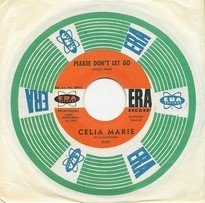
A page feature devoted to a one record artist, even if the record is great and was arranged by Jack Nitzsche, might seem a bit excessive. But what I hope makes the story of general interest, is a tale that despite myriad variations mirrors the aspirations of so many thousands of hopefuls who embarked upon the road to musical stardom. For all but a small percentage their dreams of fame and fortune faded with only a few memories. Celia, despite missing out on the fortune (this isn't a fairy tale!), did get to top her local Tucson pop charts, achieve local fame and still clings to her dreams! The article features Celia's story told by her son Michael Gleisner, promotional photos, label scans and (for a limited time) mp3s.
Other female artists of the time and place also have part of their story told including a great interview with Vikki Sallee.
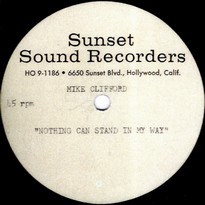
Mike Clifford - Nothing Can Stamd In My Way.mp3
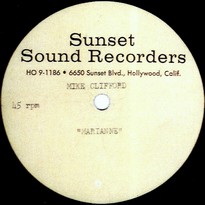 Mike Clifford - Marianne.mp3
Mike Clifford - Marianne.mp3
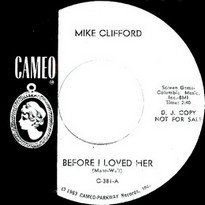 Mike Clifford - Before I Loved Her.mp3
Mike Clifford - Before I Loved Her.mp3
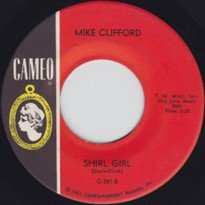 Mike Clifford - Shirl Girl.mp3
Mike Clifford - Shirl Girl.mp3
During 1964 & 1965 Mike was very busy touring with The 'Dick Clark Caravan Of Stars'. It was in 1965 when his manager, Helen Noga began promoting him for acting roles that the film 'Village of The Giants' came about. Mike knew some of the people who were involved with the production of that film, and he was told that although the picture had already been cast, they would love to feature him in a guest star singing role. Some weeks later he learned that he would be singing two songs written for him for the film by Jack Nitzsche and Russ Titelman and that Nitzche would be overseeing the recording session. Mike then went to the Noga home at 806 N. Elm Dr. in Beverly Hills to rehearse the songs on the piano with Russ Titelman which were entitled, 'MARIANNE' and 'NOTHING CAN STAND IN MY WAY'. They taped the rehearsal so that Mike could listen to it for a few days to familiarize himself with the tunes before the actual session. After the backing tracks for the two songs were finished Mike met Jack Nitzsche at Sunset Sound Recorders in Hollywood for the session which was scheduled for 8:00 p.m. Mike recalled how stunned he was after hearing the backing tracks for the two songs and that the music and arrangements were beyond his expectations. He remembered that he went through 'MARIANNE' easily and had that finished in about an hour. It was 'NOTHING CAN STAND IN MY WAY' that was a challenge for him. Hitting the 'G' at the end of the phrase, "Girl, now I've got you you and nothing can stand in my way" was at the top of his vocal register. After each consecutive take, Jack would say, 'That's great Mike. Really. We've almost got it." Then another take and then another. Eventually they had food brought in and Jack had Mike drink a few beers to loosen up. He would tell him, "When you get to that part, just do it. Go for it. Don't worry about hitting the right note. Just sing it." It wasn't until almost 4:00a.m. that they were both satisfied with the recording. An acetate was made and given to Mike so that he could learn the tunes precisely for lip-synching them in the film.
A short time later, Mike went to Columbia Ranch Studio in Burbank for his part in the filming of 'Village Of The Giants'. When the final edit of the film was complete, 'NOTHING CAN STAND IN MY WAY' which was supposed to be in the opening credits, ended up on the cutting room floor while less than a minute of 'MARIANNE' would be included in the film.
These two recordings with Jack Nitzsche led to the two record deal with Cameo-Parkway Records. In 1965, Mike recorded Barry Mann & Cynthia Weil's 'BEFORE I LOVED HER' and 'SHIRL GIRL' written by Rudy Clark and Bobby Darin. Jack Nitzsche produced and arranged these tracks. 'BEFORE I LOVED HER' had been previously recorded by Johnny Maestro in 1962 and spoke of the joys of love. The version by Mike had the lyrics re-written to reflect the pain of love. 'SHIRL GIRL' had been recorded by Wayne Newton on Capitol in 1963.
The second Cameo Records disc by Mike Clifford was recorded in late 1965 and issued in early 1966. The songs were 'OUT IN THE COUNTRY' written by Perry Botkin Jr. & Johnny Cole and 'COUNTIN' written by Harry Nilsson. The session was arranged by Perry Botkin Jr., and recorded at Gold Star Studio in Hollywood.
Mike looks back fondly working with Jack Nitzsche on these recordings and is very proud of them and credits those records as the point in time when he began his transition from teen idol material to other styles of music.
Anthony Reichardt






